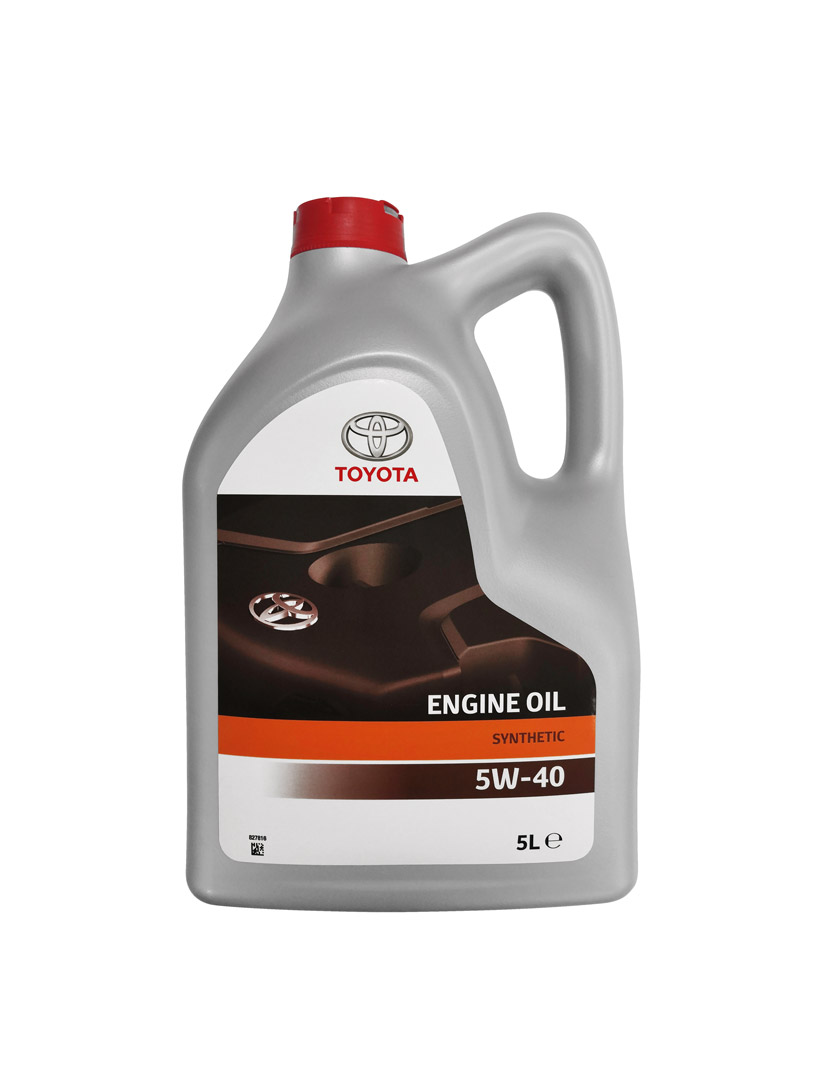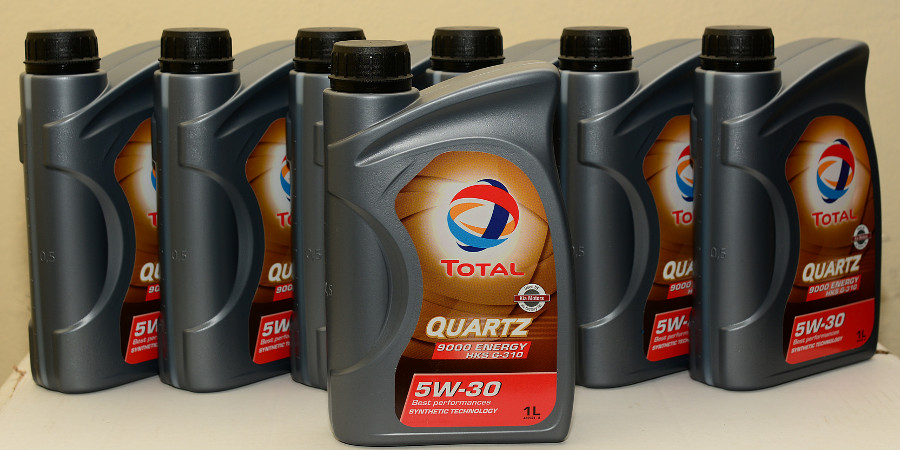
Oil selection Total
Content
Surely at least once you wondered which engine oil is best to use for your car. After all, the period of operation and the mileage of the car before the first overhaul will depend on the correct choice. Naturally, everyone wants this race to be as long as possible. To solve this problem, it is necessary to have a good understanding of the composition and main characteristics of lubricant mixtures.
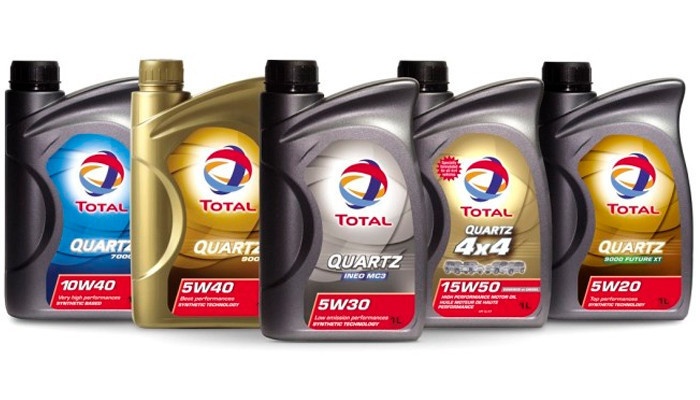
The main components of motor lubricant
Oil mixtures consist of two main components. The first and most important of these is the composition of the base oil, or the so-called base. The second is a package of additives, which should seriously improve the characteristics of the base.
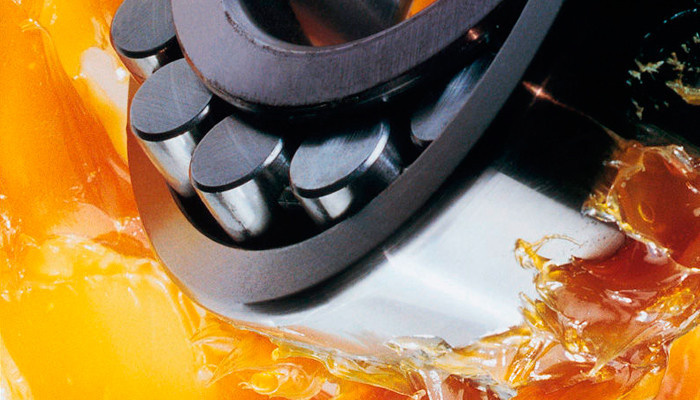
Base oil fluids
There are three types of base fluids: mineral, semi-synthetic and synthetic. According to the classification of the American Petroleum Institute (API), these fundamentals are not divided into 3, as is commonly believed, but into 5 groups:
- Base fluids are selectively purified and dewaxed. They are mineral compositions of the lowest quality.
- Bases for which hydroprocessing was invented. With the help of this technology, the content of aromatic compounds and paraffins in the composition is reduced. The quality of the resulting liquid is normal, but better than that of the first group.
- To obtain base oils of the 3rd group, the technology of deep catalytic hydrocracking is used. This is the so-called NS synthesis process. But before that, the oil is processed in the same way as in groups 1 and 2. Such oil compositions are much better than the previous ones in terms of their qualities. Its viscosity index is higher, which indicates the preservation of working qualities in a wider temperature range. The South Korean company SK Lubricants has achieved excellent cleaning results by improving this technology. Its products are used by the world's leading manufacturers. Companies such as Esso, Mobil, Chevron, Castrol, Shell and others take this base for their semi-synthetic oils and even some cheap synthetics - they have quality characteristics. This is more. This liquid is used to make the famous Johnson Baby Oil. The only negative is that the basic composition of the SC "ages" faster than the synthetic bases of the 4th group.
- To date, the most popular group is the fourth. These are already fully synthetic basic compounds, the main component of which are polyalphaolefins (hereinafter - PAO). They are obtained by combining short hydrocarbon chains using ethylene and butylene. These substances have an even higher viscosity index, retaining their working properties both at very low (up to -50°C) and high (up to 300°C) temperatures.
- The last group includes substances not listed in all of the above. For example, esters are base formulations derived from natural oils. For this, for example, coconut or rapeseed oil is used. Thus bases of the highest quality from all known for today turn out. But they also cost several times more than formulas of base oils from oils of groups 3 and 4.
In oil paintings of the Total family, the French company TotalFinaElf uses the basic compositions of groups 3 and 4.
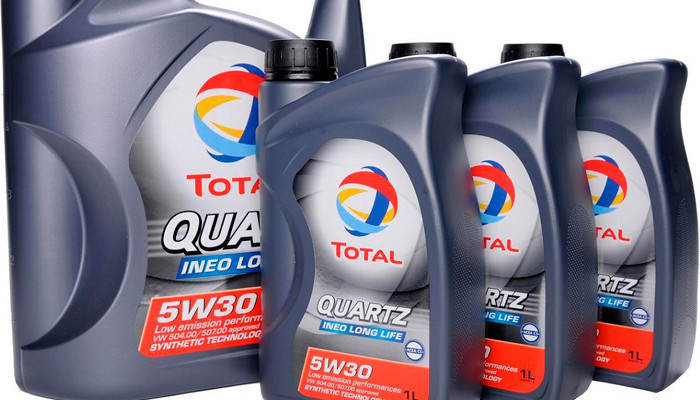
Modern additives
In modern automotive oils, the additive package is quite impressive and can reach 20% of the total volume of the lubricant mixture. They can be divided according to purpose:
- Additives that increase the viscosity index (viscosity-thickener). Its use allows you to maintain working qualities in a wider temperature range.
- Substances that clean and wash the engine are detergents and dispersants. Detergents neutralize the acids formed in the oil, preventing corrosion of parts, and also flush the engine.
- Additives that reduce wear of engine parts and extend their life in places where the gaps between parts are too small for the formation of an oil film. They are adsorbed on the metal surfaces of these parts and subsequently form a very thin metal layer with a low coefficient of friction.
- Compounds that protect oily liquids from oxidation caused by high temperatures, nitrogen oxides and oxygen in the air. These additives chemically react with substances that cause oxidative processes.
- Additives that prevent corrosion. They protect the surfaces of parts from substances that form acids. As a result, a thin layer of a protective film is formed on these surfaces, which prevents the process of oxidation and subsequent corrosion of metals.
- Friction modifiers to reduce their value between parts when they come into contact in a running engine. To date, the most effective materials are molybdenum disulfide and graphite. But they are difficult to use in modern oils, because they cannot dissolve there, remaining in the form of tiny solid particles. Instead, fatty acid esters are often used, which can be dissolved in lubricants.
- Substances that prevent the formation of foam. Rotating at a high angular velocity, the crankshaft mixes the engine's working fluid, which leads to the formation of foam, sometimes in large quantities, when the lubricant mixture is contaminated. This implies a deterioration in the efficiency of lubrication of the main engine components and a violation of heat dissipation. These additives break down the air bubbles that form the foam.
Each brand of Total Synthetic Oils contains all of the additive types listed above. Only their selection is carried out in different quantitative ratios depending on the specific brand of a particular oil composition.
Temperature and viscosity classifier
There are four main classifications that characterize the quality of lubricants. First of all, it is the SAE classifier, the Society of Automotive Engineers. Important parameters such as the operating temperature range and the viscosity of the engine oil depend on it. According to this standard, lubricants are winter, summer and all-weather. Below is a diagram that clearly demonstrates the temperature range in which winter and all-weather oil fluids operate. Winter varieties with winter viscosity designation: 0W, 5W, 10W, 15W, 20W. The rest are all season.
SAE 0W-50 grease has the widest operating temperature range. The number after the letter W (winter - winter) indicates the viscosity of the lubricant. The lower this number, the lower the viscosity of the motor fluid. It ranges from 20 to 60. Do not confuse indicators such as "viscosity" and "viscosity index" - these are different characteristics.
Low-viscosity formulations such as 5W20 help a car start quickly in cold weather by reducing friction between engine parts. At the same time, the thin oil film they form can break down at high temperatures (100-150°C), which leads to dry running of some engine parts. This occurs in engines where gaps between parts do not allow the use of a low viscosity oil mixture. Therefore, in practice, auto engine manufacturers are looking for compromise options. The selection of lubricant must be made on the basis of the technical documentation of the vehicle manufacturer.
The most recommended viscosity for relatively new modern engines is 30. After a certain mileage, you can switch to more viscous compounds, for example, 5W40. It should be remembered that more viscous lubricants with a value of 50, 60 lead to increased friction in the engine piston group and increased fuel consumption. With them, the engine is more difficult to start in icy conditions. At the same time, these compounds create a dense and stable oil film.
Main classifiers of qualitative indicators
API
The second largest US classifier is API, the brainchild of the American Petroleum Institute. He divides automobile engines into three types. If the first letter of the category is S, then this indicator is for gasoline units. If the first letter is C, then the indicator characterizes diesel engines. The EU abbreviation stands for Advanced Energy Efficient Lubricant Blend.
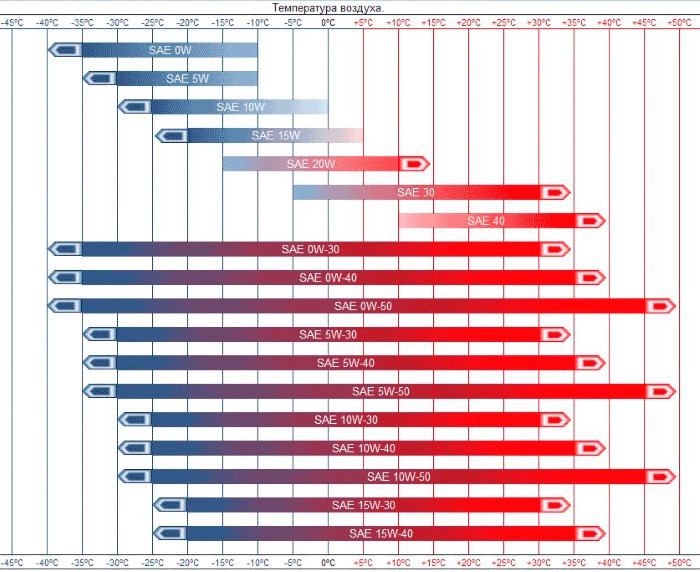
In addition (in Latin), they follow the letters indicating the age index of the engines for which this engine oil is intended. For gasoline engines, several categories are relevant today:
- SG, SH - These categories refer to older power units manufactured between 1989 and 1996. Currently no longer applicable.
- SJ - A lubricant with this API can be found commercially, it is used for engines manufactured between 1996 and 2001. This lubricant has good characteristics. There is backward compatibility with category SH.
- SL - the category has been valid since the beginning of 2004. Designed for power units manufactured in 2001-2003. This advanced lubricant blend can be used in multi-valve and lean-burn turbocharged engines. Compatible with previous versions of SJ.
- CM - This class of lubricants was adopted at the end of 2004 and applies to engines that have been produced since the same year. Compared to the previous category, these oily fluids have higher antioxidant resistance and are better at preventing deposits and deposits. In addition, the level of wear resistance of parts and environmental safety has been increased.
- SN is the standard for the highest quality lubricants compatible with the latest powertrains. They significantly reduce the level of phosphorus, so these oils are used in systems with aftertreatment of exhaust gases. Designed for engines manufactured since 2010.
For diesel power plants, a separate API classification applies:
- CF - for vehicles since 1990 with indirect injection diesel engines.
- CG-4: For trucks and buses built after 1994 with turbocharged diesel engines.
- CH-4: These lubricants are suitable for high speed engines.
- SI-4 - this category of lubricants meets higher quality requirements, as well as soot content and high-temperature oxidation. Such motor fluids have been produced for modern diesel units with exhaust gas recirculation manufactured since 2002.
- The CJ-4 is the most modern class of heavy-duty diesel engines produced since 2007.

The number 4 at the end of the designations indicates that the engine oil is intended for four-stroke diesel engines. If the number is 2, this is a substance for two-stroke engines. Now many universal lubricants are sold, that is, for gasoline and diesel engine installations. For example, many brands of French Total oils have the API SN / CF designation on canisters. If the first combination begins with the letter S, then this grease is intended primarily for gasoline power plants, but it can also be poured into a diesel engine running on CF category oil.
ACEA
Total synthetic and semi-synthetic lubricants are more in line with the ACEA standard, the Association of European Manufacturers, which includes world leaders in the automotive industry, such as BMW, Mercedes-Benz, Audi and others. This classification imposes more stringent requirements on the characteristics of engine oil. All lubricant mixtures are divided into 3 large groups:
- A / B - this group includes lubricants for gasoline (A) and diesel (B) engines of small cars: cars, vans and minibuses.
- C - the designation of fluids that lubricate engines of both types, with exhaust gas purification catalysts.
- E - marking of lubricants for diesel engines operating in heavy load conditions. They are installed on trucks.
For example, A5 / B5 is the most modern category of lubricants with a high viscosity index and stability of properties over a wide temperature range. These oils have long drain intervals and are used in most modern engines. In a number of parameters, they even surpass API SN and CJ-4 blends.
Today, the most widely used lubricants are in category A3/B4. They also have good property stability over a wide temperature range. They are used in high-performance power plants where direct fuel injection is used.
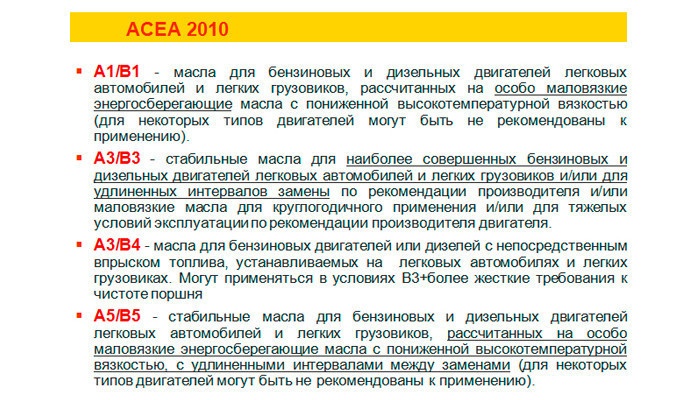
A3 / B3 - almost the same characteristics, only diesel engines can use these motor fluids throughout the year. They also have extended drain intervals.
A1/B1: These oil blends can tolerate viscosity reduction at high temperatures. If such a category of inexpensive lubricants is provided by an automotive power plant, they can be used.
Group C consists of 4 categories:
- C1 - in the composition of these mixtures there is little phosphorus, they have a low ash content. Suitable for vehicles with three-way catalytic converters and diesel particulate filters, prolonging the life of these components.
- C2: They have the same properties as C1 joints, in addition to the ability to reduce friction between parts of the power plant.
- C3 - These lubricants are designed for units that meet high environmental requirements.
- C4 - For engines that meet the increased Euro requirements for the concentration of phosphorus, ash and sulfur in exhaust gases.
Numbers are often seen at the end of ACEA category designations. This is the year the category was adopted or the year the last changes were made.
For Total engine oils, the previous three classifiers of temperature, viscosity and performance are the main ones. Based on your values, you can choose a lubricant mixture for any make and model of machine.
TotalFinaElf Product Families
The French company produces automotive motor oils under its Elf and Total brand names. The most popular and versatile today is the Total Quartz family of lubricants. In turn, it includes such series as 9000, 7000, Ineo, Racing. The Total Classic series is also produced.

Video 9000
The Quartz 9000 lubricant line has several branches:
- TOTAL QUARTZ 9000 is available in 5W40 and 0W viscosity grades. The oil is approved for use in vehicles from manufacturers such as BMW, Porsche, Mercedes-Benz (MB), Volkswagen (VW), Peugeot and Sitroen (PSA). Produced using synthetic technology. It has high antiwear and antioxidant properties. The high viscosity index makes it easier to start the engine in cold weather, and also retains its basic qualities at high temperatures inside the engine. Protects the engine from wear and harmful deposits. It performs well in difficult conditions, such as city driving with frequent stops, sports driving. Oily fluid - universal, SAE specification - SN / CF. ACEA classification - A3 / B4. For petrol and diesel engines manufactured since 2000.
- 9000 ENERGY is available in SAE 0W-30, 0W40, 5W-30, 5W-40 specifications. The oil has official approvals for Mercedes-Benz, Volkswagen, BMW, Porsche, KIA. This synthetic is suitable for all modern gasoline engines, including those equipped with catalytic converters, turbochargers and multi-valve cylinder head designs. In the same way, it can service diesel engines, both naturally aspirated and turbocharged. Not suitable only for units with a particulate filter. Lubricating mixtures are adapted to high loads and temperature conditions. Handles vigorous, high-speed driving very well. Change intervals have been extended. According to the ACEA specification, they are class A3/B4. API quality is SN/CF. Backwards compatible with SM and SL.
- ENERGY HKS G-310 5W-30 is a synthetic oil developed by Total for Hyundai and Kia cars from South Korea. Used by the manufacturer as a first fill lubricant. Can be used in all gasoline power units of these vehicles. It has excellent anti-wear properties. Quality indicators: according to ACEA - A5, according to API - SM. Very good stability and resistance to oxidative processes allow extended drain intervals up to 30 km. It should be remembered that for Russian operating conditions this value is 000 times less. The choice of this oil for new Korean cars was approved in 2.
- 9000 FUTURE - This product line is available in three SAE viscosity grades: 0W-20, 5W-20, 5W
- TOTAL QUARTZ 9000 FUTURE GF-5 0W-20 was developed by the French for gasoline engines of Japanese Mitsubishi, Honda, Toyota cars. Therefore, in addition to the API - SN specification, this grease also meets the stringent modern requirements of the American-Japanese ILSAC standard, with the GF-5 category. The composition is well cleaned of phosphorus, which ensures the safety of exhaust gas aftertreatment systems.
- The composition of FUTURE ECOB 5W-20 is similar in quality to GF-5 0W-20. Has homologation for Ford cars, except for Ford Ka, Focus ST, Focus models. According to the international classification ACEA category A1 / B1, according to the API specification - SN.
- FUTURE NFC 5W-30 meets the most stringent requirements of car manufacturers. There are Ford approvals for warranty service for cars of this manufacturer. Also recommended for KIA vehicles, but not for all models. Universal grease for both types of engines. Suitable for multi-valve turbocharged combustion engines and direct injection engines. It can be poured into power plants with catalytic afterburning of exhaust gases, as well as those running on liquefied gas and unleaded gasoline. According to the API classifier - SL / CF, according to ACEA - A5 / B5 and A1 / B1.
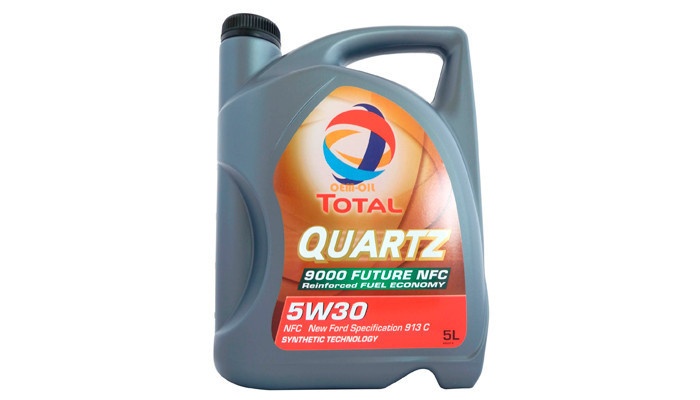
Ineo-series
This series includes high quality synthetic products, including LOW SAPS engine oils with a low content of sulfates, phosphorus and sulfur ash. The additives in these oils are based on LOW SAPS technology. Exhaust gases when using such oils comply with the environmental requirements of Euro 4, as well as Euro 5.
- TOTAL QUARTZ INEO MC3 5W-30 and 5W-40 are synthetic working fluids for gasoline and diesel engines. LOW SAPS technology applied. Automakers BMW, Mercedes-Benz, Volkswagen, KIA, Hyundai, General Motors (Opel, Vauxhall, Chevrolet) recommend pouring this mixture into their cars during warranty and post-warranty service. It is used in cars with three-way catalytic converters for afterburning exhaust gases, as well as in particulate filters that reduce CO2, CO and soot emissions. These synthetic fluids comply with Euro 5 performance and environmental standards. Classes ACEA C3, API SN/CF.
- INEO ECS 5W-30 is an all-weather synthetic fluid with a low phosphorus and sulfur content. Recommended by manufacturers such as Toyota, Peugeot, Citroen. It has a low sulfate ash content. The percentage of metal-containing additives in the mixture is reduced. Energy saving lubricant, saves up to 3,5% fuel. Helps reduce CO2 and soot emissions by controlling exhaust emissions. Improves the performance of catalytic converters. ACEA C compliant No API information available.
- INEO EFFICIENCY 0W-30: specially developed for BMW engines, meets ACEA C2, C3 specifications. The anti-wear, detergent and dispersant properties of this motor fluid are at the highest level. Very good low temperature fluidity. It is used in conjunction with exhaust gas treatment systems, such as a 3-way catalyst, a particulate filter.
- INEO LONG LIFE 5W-30 is a new generation of low-ash synthetics. This universal grease has been specially developed for German car manufacturers: BMW, MB, VW, Porsche. Extends the life of exhaust gas aftertreatment systems and particulate filters. The composition of the mixture contains 2 times less metal compounds than traditional oils. Therefore, it has a long interval between replacements. According to the ACEA specification, it has a category C3. The composition of the oil is made according to LOW SAPS technology, has a high resistance to oxidation.
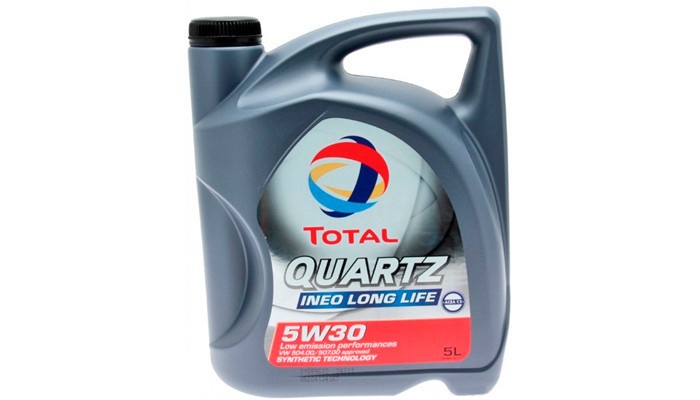
- INEO FIRST 0W-30 is a universal synthetic developed for PSA (Peugeot, Citroen) as an engine fluid for the first fill. Used in new, e-HDI and hybrid engines manufactured by PSA. Also suitable for Ford engines. A low ash formula with a low content of sulfur, phosphorus and metal components allows the lubricant to be used in the latest engines equipped with exhaust gas aftertreatment systems, as well as particulate filters. According to the ACEA specification, it has a level of C1, C2.
- INEO HKS D 5W-30 is also designed as a first fill fluid for KIA and Hyundai vehicles. It meets the most stringent quality and environmental standards adopted by Korean car manufacturers. Ideal for diesel engines, including the latest particulate filters. According to ACEA, the quality is at LEVEL C2.
Racing series
The series includes all-weather synthetic engine oils for gasoline and diesel engines: RACING 10W-50 and 10W-60. The oils are designed for BMW M-series vehicles.
They will also be adapted to cars from other manufacturers if they comply with the technical documentation for these models. Well protect the engine from wear, remove carbon deposits and other deposits. They contain modern detergent and dispersant additives. Suitable for heavy-duty applications: aggressive sport riding and long traffic jams. They correspond to the SL/CF API classes.
Video 7000
This series includes synthetic and semi-synthetic lubricants, universal, as well as for diesel internal combustion engines.
- TOTAL QUARTZ 7000 10W-40 is a synthetic engine oil. Homologations for PSA, MB and VW brands are allowed. It can be used in cars equipped with afterburning catalysts, as well as when refueling with unleaded gasoline or liquefied gas. Suitable for diesel, biodiesel fuel. Well suited for turbocharged internal combustion engines as well as multi-valve engines. This engine fluid should only be used under normal driving conditions. Sports driving and constant city traffic jams are not for her. Specifications ACEA - A3 / B4, API - SL / CF.
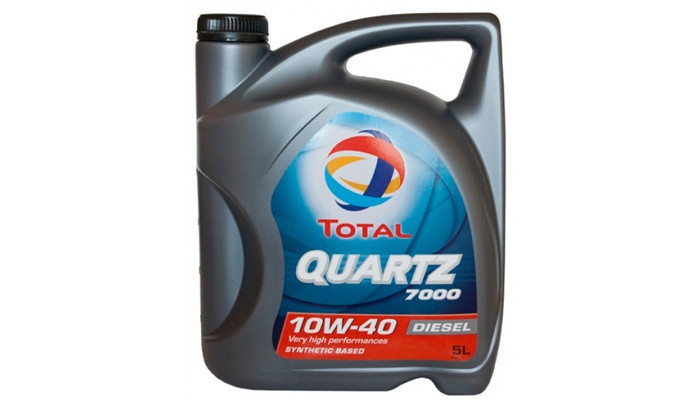
- 7000 DIESEL 10W-40 - This diesel engine blend is a new formula. Added modern effective additives. There is an official approval of PSA, MB. High resistance to oxidative processes, good antiwear and detergent properties make it possible to use the oil in modern diesel internal combustion engines - atmospheric, turbocharged. It is not designed for severe operating conditions with extreme temperature conditions. Complies with ACEA A3/B4 and API SL/CF.
- 7000 ENEGGY 10W-40 - created on a semi-synthetic basis, universal. The product is approved for use by German manufacturers: MB and VW. The lubricant is designed for both types of internal combustion engines with direct and indirect fuel injection. Turbocharged, high valve engines are also well served by this oil. You usually think of this type of fuel as LPG, unleaded gasoline. The main characteristics are the same as previous oils of the 7000 series.
Video 5000
This includes economical formulations of mineral-based oils. Despite this, they meet the stringent requirements of current standards.
- 5000 DIESEL 15W-40 is an all season blend of mineral lubricants for diesel engines. Approved for use by PSA (in their Peugeot, Citroen vehicles) as well as Volkswagen and Isuzu. The grease has modern additives that guarantee good anti-wear, detergent and antioxidant properties. It can be used for turbocharged and naturally aspirated power units, as well as engines with indirect fuel injection. Suitable for diesel engines without particulate filter. ACEA-B3, API-CF.
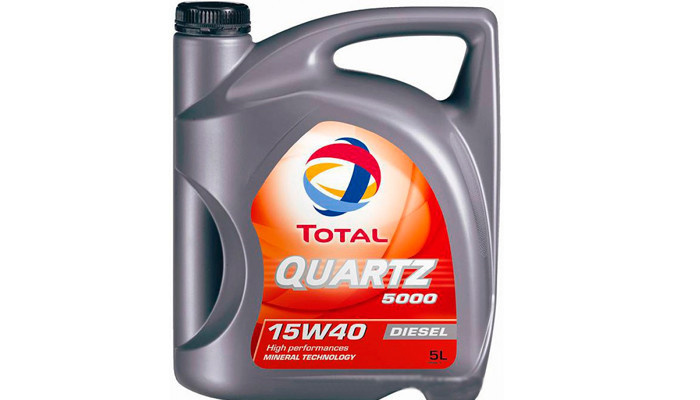
- 5000 15W-40 is a mineral oil for both types of engines. The product is approved by PSA (Peugeot, Citroen), Volkswagen, Isuzu, Mercedes-Benz. It has all the qualities inherent in the previous lubricant composition of this series. In addition, it can be used in vehicles with catalytic converters that burn exhaust gases. You can use unleaded petrol or LPG as fuel. Classifiers ACEA assigned him the category A3 / B4, API - SL / CF.
Classic series
These lubricants are not part of the Quartz family. There are 3 lubricants of this series offered on the Russian market. They do not yet have official permits from automakers.
- CLASSIC 5W-30 is a high quality multi-purpose lubricant meeting the highest ACEA performance classes - A5/B5. According to the API standard, it corresponds to API SL / CF. It has good fluidity, which will ensure easy engine starting at any temperature and fuel economy. Well suited for multi-valve turbocharged engines as well as diesel engines with direct injection.
- CLASSIC 5W-40 and 10W-40 are universal synthetic oils for passenger cars. The detergent, antioxidant and anti-corrosion properties of these motor fluids meet the highest requirements of international specifications. In ACEA, the lineups received categories A3 / B4. According to the SAE standard, they have classes SL / CF. Recommended for use in all types of powertrains: multi-valve, turbocharged, equipped with a catalytic converter. It is also suitable for naturally aspirated or turbocharged diesel engines.
As can be seen from the above, the French refinery TotalFinaElf produces quality lubricants for automotive engines. They are officially approved and endorsed by the world's leading car manufacturers. These lubricants can be successfully used in car models of other brands.
